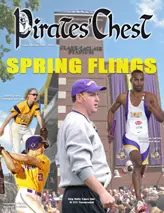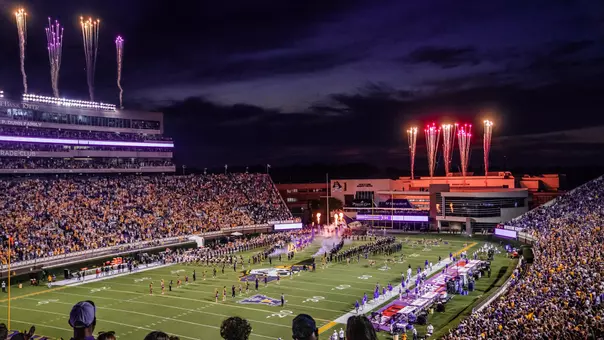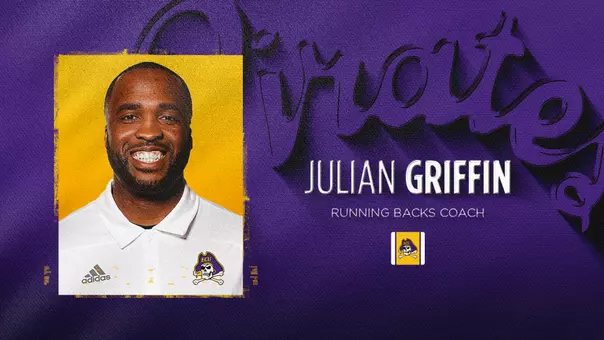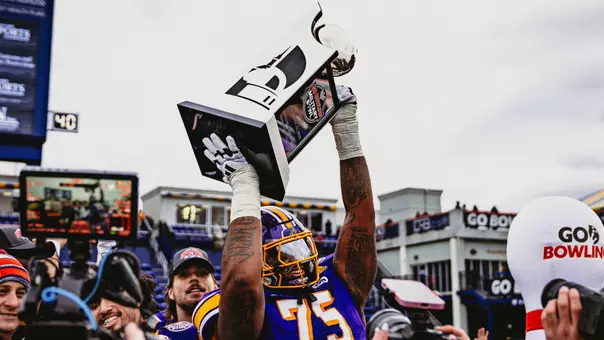
A Visit With Skip Holtz
June 08, 2005 | Football
In an effort to help promote the commemorative final issue of Pirates' Chest Magazine, ECUPirates.com was granted permission to provide fans an early glimpse of writer John Roth's recent Q&A session with East Carolina Head Football Coach Skip Holtz.
New ECU football coach Skip Holtz has been a man in perpetual motion since he was hired late last fall. His first several weeks were spent hiring his coaching staff and recruiting. Then came the job of evaluating all of the Pirate players, conducting winter conditioning workouts and getting his new team on the field for spring practice.
Life didn't quiet down any when drills ended in April. May is one of the most important months on the recruiting calendar, and for Holtz it was also time to get acquainted with the Pirate Nation. He traversed the state visiting Pirate Club chapters and also headed to Washington, D.C., Atlanta and Virginia ? 20 stops in all for one month, not including an assortment of civic and sports clubs.
Holtz and his coaches will take some down time later in June and early in July to recharge for preseason training camp and the 2005 season. As June began, Holtz took some time for an office visit with Pirates' Chest to talk about how the honeymoon has been going.
"From the day we said 'I do,' the day this whole marriage started, it has been a case of hitting the ground with your feet running? It's been a whirlwind, but it's been awesome. It's been great to get in with these players and put faces and names together and understand who they are and what they're doing. They really have a positive attitude in what they are doing and the way they are working.
"Getting out to the Pirate Clubs, meeting the Pirate Nation and seeing their excitement and enthusiasm has also been a treat for me. Greenville, the people here, could not be any better. It's been awesome, a great six months, a busy six months, but it's gone really well.
"Probably the biggest problem you have, as a new staff, is trying to get nine people on the same page. It's the first winter workouts, it's the first spring ball, the first summer camps. Next year, what took us three days of meetings to set up winter workouts, will be a 30-minute meeting to say we did XYZ, do we want to change anything, let's go to work. That's been the hardest part, just the time commitment involved in getting everybody on the same page, because the last thing you want to do is be unorganized as a new staff. There's been a commitment by the staff to get everybody together and make sure all the T's are crossed and the I's dotted. But from the players' attitudes to the response from the fans to the way my family has settled in, it's all been extremely positive."
PC: Speaking of your staff, most people have been very impressed with the group you've put together. You're trying to get on that same page with guys you know well or have worked with before.
"There were three things I was looking for in putting this staff together. (1) I wanted people with East Carolina experience, guys like Junior Smith, Steve Shankweiler, Donnie Thompson, guys like that. (2) I wanted guys with an eastern North Carolina recruiting base or a North Carolina recruiting base and obviously we got that with Junior being from Fayetteville, Donnie Thompson recruiting this side of the state and Shankweiler recruiting here before. Donnie Kirkpatrick's father was a high school coach and his two brothers are high school coaches in North Carolina.
"Then (3) I wanted a Skip Holtz flavor, people I've been with and worked with who understand how we're going to do things, guys like Rock Roggeman, Greg Hudson, Phil Petty. I've known Greg McMahon forever. I wanted experience. I didn't want to bring an inexperienced staff in here.
"I think the most important thing you do as a head coach is hire your staff. I made some mistakes when I was head coach at Connecticut. Once you've hired six or seven coaches, it's almost like you're spent. You've put so much time and energy and research into making sure you don't make a mistake. By the time you get to seven, eight and nine, you're like, 'Just hire them.' Here, when we got to seven, which is the full amount you can have on the road at one time, we just stopped. I wanted to hire the last two with the same energy and enthusiasm I had when I hired the first two. So we stopped, then later we brought in Greg McMahon and Rick Smith, who may be two of our most experienced coaches.
"I could not be more pleased. When you try to put a staff together you try to look at everybody individually. When we got to seven, there was such a great nucleus with the guys we hired. There were no egos. They jelled so well together. I'd love to take credit, but it just worked out a thousand times better than I would have imagined. When we got to seven we had a good core, and I wanted those seven involved with the last two. I didn't want to bring somebody in to disrupt that nucleus.
It was important for the offensive staff to interview Greg McMahon and for the defensive staff to interview Rick Smith. Then they could come to me and say this is a home run, they're going to fit in. Because I think one of the most positive things we have going is the way everybody has checked their ego at the door and come into a staff environment. When you can go around the room and the ideas are not about me, but about what is best for the program, I could not have hired nine better people to come together. The resumes are impressive, but more impressive to me is the way they interact with each other and the way they have jelled together."
PC: Was your first winter and spring mostly a get-to-know-you time for you and your staff to learn about the players, their personalities and what they could do?
"Through winter workouts, yes, it was the time to get to know the players, get to know who they are, get an evaluation of where we are athletically at each position. The first half of spring there was a lot of trying to identify who could do what. As a new staff, one of our biggest jobs is not to enforce our will and say, 'We're going to do this,' but it's to look at our talent and say, 'What can we do to accentuate our strengths and hide our weaknesses?'
"If you have a running quarterback, you can't come in and say we're going to throw it 40 times a game. If you have a throwing quarterback, you can't come in and say we're going to run the option up and down the field. For us, the first half of spring was individual, trying to improve fundamentals and evaluate what we can do. Let's see where we are as a work in progress.
"Then when we hit the halfway point in spring ball, that was the time to start putting the team together. Then we started working on more team concepts, with everybody working together to see how they fit. We still have a long way to go. We have a pretty good evaluation of where we are, but one of the things that hampered us offensively was the number of players who missed spring ball. Quarterback, offensive line, tight end ? we had about nine juniors and seniors who've played here who missed spring ball. When you take nine of 11 starters off the board, we don't know what we can do because we haven't had an opportunity to evaluate those guys who were missing. Defensively we're a little farther along because we didn't have as many guys missing, so we could put the core nucleus together.
"The thing we still have to do is continue to build the team, and we have to learn how to win. We have to learn what mistakes you can live with, and what mistakes are ultimate no-no's that get you beat. There are degrees of mistakes. There are some you can overcome and some you just can't make. When you get down on the goal line, first-and-goal on the two, and try to force a ball and throw an interception, that's a major no-no that will get you beat. That will hurt. So we have to understand the consequences of our decisions in the grand scheme of how to win. It's not about making a play, not about a read, not about forcing it in there. The two ultimate goals we have are building the team togetherness and understanding how you win."
PC: In grand scheme of evaluating the players, did you look at what they did last year?
"No, everything has been a clean slate. We walked in and made our own evaluations. What's hard about evaluating last year's film is that I don't know what they were being taught to do. They may have been doing something they were taught to do because it fit into the system the way they were doing it. It may not fit into the system the way we're doing it.
"Successful football and coaching is all about playing within your system, and there are a lot of ways to skin a cat. There are a lot of different ways to teach something. You can have the same route and teach your quarterback three different ways to read it, predicated on what you want. Do you want it as a ball control, hitting the underneath stuff first when it's a third-and five call? Or do you want it as a third-and-12 call where you are looking down the field first and your outlet is underneath? I don't know what they were teaching, so it was hard to evaluate.
"We watched last year's film to find out where our talent level is compared to the people we have to play in our conference. But we tried to make all our own evaluations in spring practice."
PC: You mentioned all the guys who were out on offense. I think most fans are familiar with your quarterback situation. How much does it hamper you to have that uncertainty at the main position?
"Terribly, terribly. If there's one thing that concerns us the most, it's that. That position is not built overnight. It's not one you can make in a day. You can take a freshman and have him play receiver because he's really blessed with great speed and athleticism. You send him down the field and throw it up and let his ability take over. 'That's our ball, we want it, go get it.'
"For a quarterback, there is a teaching progression. One is getting the quarterback to understand the plan. Two, it's your natural leadership position, and it's very hard to lead when you don't know who's going to be your leader. With those two things, more than at any other position on the field, it hurts us. It hurts us to have the uncertainty and the unknown.
"My biggest concern going into practice is that we're going to have to make an early evaluation on the quarterback situation and who's going to be the man. I really wanted to come out of spring and be able to name a starter. It just didn't work out. I don't say you're the starter because you're next in line, and I don't say you inherit the position, because you earn it. So it bothers me that we couldn't name a starter.
"If we try and get four ready, we're going to have none. We'll get four guys up to 50 percent instead of one guy at 100 and one guy at 75. We're going to have to draw a line in the sand and make a decision early, and it's going to be difficult because we won't be able to evaluate in-depth like we could have if they were all available in the spring."
PC: When do you think you will know who exactly is available to the quarterback pool this year?
"I think we'll have a pretty good idea on Patrick (Pinkney), how he's going to recover from his shoulder, this summer. We'll get a good idea of his strength level through all the testing they can do, and we'll know if he can be at full speed or not. With James (Pinkney, last year's starter), it's going to go down to the wire. He's got things he needs to do, and we're not going to know until we come to camp probably."
PC: This was a pretty solid program for years and then it just bottomed out in a couple of seasons. Can the return back be as quick as the fall was? Certainly a lot of people look at South Carolina when they went from 0-11 to 8-4 in one year. Is such a quick return possible here?
"It's a lot easier to tear down than to build, in anything, not just a football program. It's a lot easier to walk away from a relationship than it is to build it. I've said this a million times, but the most important thing we do from a long-term standpoint for this program is recruiting. Recruiting may also be the most over-analyzed and over-publicized thing we do as well.
"The guys we'll be putting the saddle on this year are the juniors and seniors. They are the guys who were recruited by (Steve) Logan, to put it in perspective. Recruiting is the most important thing you do because those are the guys you're going to put the saddle on. You've got to do a great job in recruiting. But you're not going to win playing with freshman and sophomore recruits. You are going to win with your upperclassmen.
"People look at a great recruiting class and want it to be an immediate impact in wins that season. The recruiting that this program did four and five years ago is where we're putting our saddle right now.
"So, do I think it can be as quick going up as it was coming down? I think it's harder to build it, but I think from the recruiting aspect, the people who were recruited a few years ago are going to be our leaders. The biggest way we can make an immediate impact is to change the attitude. That's what we have to do. How quick we can turn this around is how quick we can change these attitudes. And when I say turn around, I don't mean win 10 games. I mean be competitive.
"How long will it take us? I don't know how many we can win or how good we can be, but I want to make sure we're as good as we can be, that we've built a team, that our attitude is positive, that we're working hard. It's going to be a work in progress."
PC: What do you focus on in trying to change the attitude of a football team?
"I think the attitude of a team concept is the biggest thing, which I mentioned earlier when I talked about one of the two biggest things we need to do in fall camp is build a togetherness. Much like this staff has done, we need to check the egos at the door and it needs to become, 'I'll do my role if that's the role the team needs me to play.' "Not everybody can drive the bus. Somebody has got to ride on the bus, somebody has to change the tires, somebody has to pump the gas, somebody's got to work under the hood, somebody's got to wash the bus. Not all the roles are going to be glorified roles, but everybody's got to accept their role from the team concept. That's the biggest attitude we need to continue to work on, the team concept.
"There is some talent here, but we don't have enough talent to just roll the ball out there and out-athlete everybody we're playing. The only chance we have is to become a better team than the people we're playing, because it's a team game. The most talented team doesn't always win. The best team is the team that normally wins, the one that doesn't make those mistakes that get you beat.
"So that's probably the biggest thing ? attitude from work habits, expectation level, the commitment level it takes to be competitive. That's what we'll be teaching, not only the freshmen but the upperclassmen all the way down.
PC: In all of your speaking engagements this spring, is there a specific message you've tried to convey, and what kind of feedback have you received from ECU supporters?
"It's been very positive. The Pirate Club and everybody on the outside seem very supportive of where we are. I guess the overall message is about attitude, some of the things we've been talking about. It's not going to happen just because of talent and it's not going to happen because I came here. It's going to happen when this group of seniors takes the leadership role, when this group of players accepts the team concept, that's when we're going to get there.
"The Pirate Nation needs to continue to be one of the success stories for East Carolina - a group that recruits want to come and be a part of because of the way it has supported this program. I say that from a continual standpoint because they have supported this program through some lean years and attendance has been very positive for the product that has been on the field from a win-loss standpoint."








